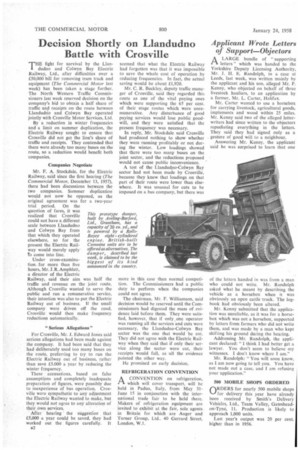Decision Shortly on Llandudno Battle with Crosville T HE fight for
Page 36

If you've noticed an error in this article please click here to report it so we can fix it.
survival by the Llandudno and Colwyn Bay Electric Railway, Ltd., after difficulties over a £50,000 bill for removing tram track and equipment (The Commercial Motor last week) has been taken a stage further. The North Western Traffic Commissioners last week reserved decision on the company's bid to obtain a half share of traffic and receipts on the route between Llandudno and Colwyn Bay operated jointly with Crosville Motor Services, Ltd.
By a reduction in winter frequencies and a limit on summer duplication, the Electric Railway sought to ensure that Crosville did not get the lion's share of traffic and receipts. They contended that there were already too many buses on the route, so a reduction would benefit both companies.
Companies Negotiate Mr. F. A. Stockdale, for the Electric Railway, said since the first hearing (The Commercial Motor, December 13, 1957), there had been discussions between the two companies. Summer duplication would not now be opposed, as the original agreement was for a two-year trial period. On the question of fares, it was realized that Crosville could not have a different scale between Llandudno and Colwyn Bay from that which they operated elsewhere, so for the present the Electric Railway would merely apply ro come into line.
Under cross-examination . for more than five hours, Mr. J.R. Amphlett, a director of the Electric Railway, said their aim was half the traffic and revenue on the joint route. Although Crosville wanted to serve the public and run a remunerative service, their intention was also to put the Electric Railway out of bu.siness. If the small company were driven off the road, Crosville would then make frequency reductions automatically.
"Serious Allegations" For Crosville, Mr. J. Edward Jones said serious allegations had been made against the company. It had been said that they had deliberately used too many buses on the route, preferring to try to run the Electric Railway out of business, rather than save 0,000 a year by reducing the winter frequency.
These accusations, based on false assumptions and completely inadequate preparation of figures, were possibly due to inexperience of bus operation. Crosville were sympathetic to any adjustment the Electric Railway wanted to make, but they would not agree to any alteration of their own services.
After hearing the suggestion that £5,000 a year could be saved, they had worked out the figures carefully. It
n2 seemed that what the Electric Railway had forgotten was that it was impossible to save the whole cost of operation by reducing frequencies. In fact, the actual saving would be about £1,920.
Mr. C. R. Buckley, deputy traffic manager of Crosvillc, said they regarded this route as one of the vital paying ones which were supporting the 65 per cent. of their stage routes which were unremunerative. Any disturbance of good paying services would lose public goodwill, and they were satisfied that the present frequency was necessary.
In reply, Mr. Stockdale said Crosville had produced nothing to show whether they were running profitably or not during the winter. Low loadings showed that there were too =my buses on the joint sector, and the reductions proposed would not cause public inconvenience.
A test of the Llandudno-Colwyn Bay sector had not been made by Crosville, because they knew that loadings on that part of their route were lower than elsewhere. It was unusual for cuts to be imposed on a bus company, but there was more in this case than normal competition. The Commissioners had a public duty to perform when the companies could not agree.
The chairman, Mr. F. Williamson, said decision would be reserved until the Commissioners had digested the mass of evidence laid before them. They were satisfied, however, that if only one operator was running all the services and cuts were necessary, the Llandudno-Colwyn Bay sector was the one that would be cut. They did not agree with the Electric Railway when they said that if only their service along the sector were cut, their receipts would fall, as all the evidence pointed the other way.
He promised an early decision.
REFRIGERATION CONVENTION jkCONVENTION on refrigeration. which will cover transport, will be held in Padua, Italy, from May 31June 15 in conjunction with the international trade fair to be held there. Makers of refrigeration equipment are invited to exhibit at the fair, sole agents in Britain for which are Auger and Turner Group, Ltd., 40 Gerrard Street, London, W.1.




































































































